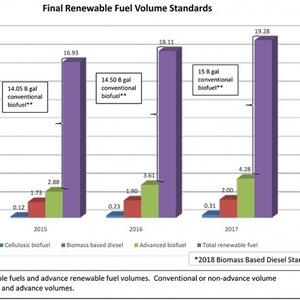2017-'18 RVOs assumed intact as regulatory freeze deadline passes

March 21, 2017
BY Ron Kotrba
March 21 represents the end of the 60-day freeze period on new regulations pending review, implemented by the incoming U.S. administration Jan. 20. Among the regulations on hold during the two-month freeze period was the final rule for the 2017-’18 renewable volume obligations (RVO) under the Renewable Fuel Standard.
While U.S. EPA has yet to announce anything on the matter, biodiesel and renewable diesel stakeholders welcome implementation of the boosted advanced biofuel volumes for 2017 and biomass-based diesel volumes for 2018, finalized by the Obama administration’s EPA last November after Donald J. Trump won the presidential election.
Advertisement
The advanced biofuel category for 2017 was finalized at 4.28 billion ethanol-equivalent gallons, up 19 percent over the 2016 RVO and up 7 percent from the 2017 proposal issued in spring 2016. The biomass-based diesel category for 2018 was finalized last November at 2.1 billion gallons, up 100 million from 2017, the same as what EPA proposed last spring.
“Though last year’s market actually outpaced the 2018 requirement, we are pleased that the rule is effective and that the industry can move forward under the program as outlined,” said Anne Steckel, vice president of federal affairs with the National Biodiesel Board. “With the help of a strong RFS, American biodiesel supports some 64,000 jobs across the nation, many the most affluent in their region. We look forward to working with EPA and the new administration as they begin the process of setting volumes moving forward and are confident American biodiesel producers can do even more to contribute to energy security, economic prosperity and clean air.”
Advertisement
Renewable diesel producer Neste Corp., which exported more than 200 million gallons of renewable diesel to the U.S. in 2016, also commented on the expiration of the regulatory freeze period.
“The regulatory freeze pending review by the new U.S. administration, which was applied to the renewable fuel volume requirements for 2017, has expired,” the company stated in a press release March 21. “Hence, the EPA continues to implement the final ruling under the RFS program as published Nov. 23.”
Kaisa Hietala, executive vice president of Neste’s renewable products business area, said, “We are pleased with the EPA’s continued commitment to the RFS program. Determination and ambitious targets are required to combat climate change globally.”
Related Stories
On April 23, the Advanced Biofuels Association (ABFA) met with officials in the U.S. EPA to convey the vital importance of domestic biofuel production to the Trump-Vance administration’s energy dominance policy agenda.
Aemetis Inc. on April 23 announced that its subsidiary in India, Universal Biofuels, has been working with the U.S. government to support the success of American interests in India. U.S. Consul General Jennifer Larson recently toured the facility.
CARB on April 4 released a third set of proposed changes to the state’s LCFS. More than 80 public comments were filed ahead of an April 21 deadline, including those filed by representatives of the ethanol, biobased diesel and biogas industries.
The Oregon Department of Environmental Quality on April 18 proposed to delay the 2024 annual report deadline for the state’s Clean Fuels Program due to a cyberattack and extended outage of the Oregon Fuels Reporting System.
The Washington Senate on April 15 voted 25 to 23 in favor of legislation that aims to update the state’s Clean Fuels Standard, setting more ambitious carbon reduction goals that would require a 45% reduction in greenhouse gas (GHG) emissions by 2038.
Upcoming Events










